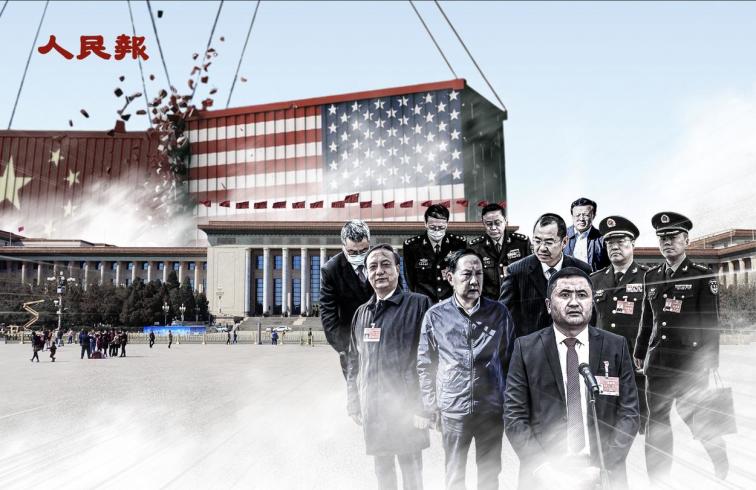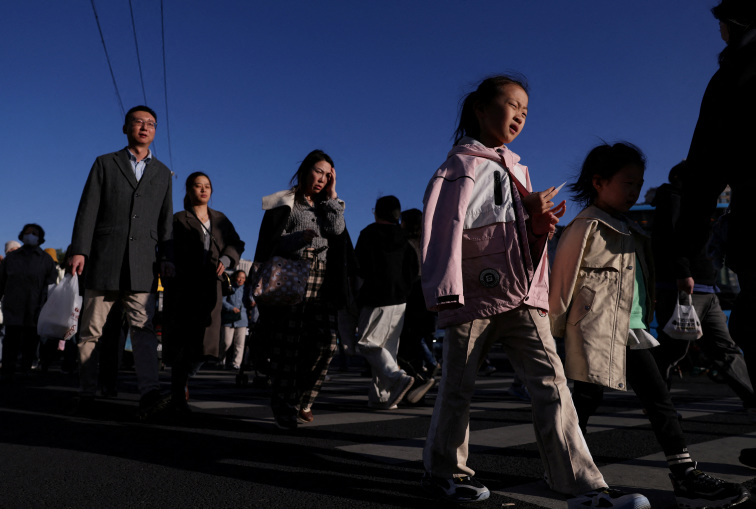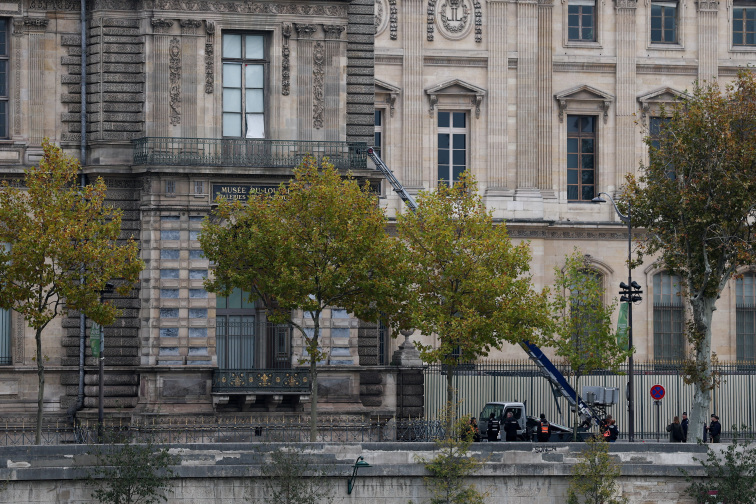File photo: On March 5, 2021, the day before the opening of China‘s National People‘s Congress (NPC), police patrol Tiananmen Square with dogs on a day of heavy air pollution in Beijing. (Photo by Kevin Frayer/Getty Images.)
[People News] On October 20, the first day of the Fourth Plenary Session of the Communist Party of China (CPC), an article published on the official website appeared to aim at redirecting attention towards the '14th Five-Year Plan'. However, it is clear that the public is more focused on the shifts within the CPC's leadership, particularly whether Xi will step down from his roles as Chairman of the Central Military Commission and General Secretary, and who might succeed him. Given the limited insider information available, we must begin by examining the signals released by official channels prior to the plenary session.
Following the military's expulsion of Xi's nine confidants, including He Weidong and Miao Hua, under allegations of 'corruption', the military newspaper seems to be attempting to distance Xi from them. Additionally, just a few days ago, at the so-called 'Nanyang Spirit' seminar in Gansu, Xi Yuanping once again minimised the significance of Xi's father, Xi Zhongxun, to the point that his name was not mentioned at all in the news coverage of Xi Yuanping's speech. Such signals are clearly unusual.
Furthermore, I noticed that on October 17, CCTV surprisingly failed to broadcast a report that praised Xi Jinping.
On October 16, Xi not only responded to all faculty and students of China Agricultural University on its 120th anniversary but also sent a congratulatory letter to the Food and Agriculture Organisation of the United Nations for its 80th anniversary for the first time. CCTV covered this event on the same day.
On October 17, CCTV reported on the reactions elicited by Xi's letter to the Agricultural University, stating that it 'motivates a large number of students and agricultural education and technology workers to strive for a strong agriculture and serve the country.' Notably, in its brief report, CCTV refrained from excessively praising Xi, instead highlighting the achievements of the Agricultural University and noting that Xi's encouragement has become a 'great motivation' for them.
In contrast, reports from Xinhua News Agency featured various leaders, faculty, and students from agricultural universities praising Xi Jinping, including a vice president who described his response as 'ambitious and inspiring, a significant recognition of the school's 120 years of dedication to agriculture and service to the 'great matters of the nation', which has provided direction for the school's development.' Such flattery was absent from CCTV's coverage.
Interestingly, on the 17th, CCTV deliberately 'missed' the news regarding Xi's congratulatory letter to the Food and Agriculture Organisation, which 'triggered a warm response.' Meanwhile, Xinhua continued to interview several foreigners, including the Assistant Director-General of the FAO, to highlight the 'huge impact' of Xi's letter. On the 18th, CCTV similarly did not air this news.
CCTV's minimisation of Xi's image, in contrast to Xinhua's praise, suggests a lack of alignment between the two official media outlets of the Communist Party. What could be the reason for this? The author speculates that as changes unfold within the upper echelons of the Communist Party, the controllers behind these media are conveying specific messages. Xinhua is likely still under the influence of Xi's confidant, Cai Qi, who oversees propaganda, while CCTV is probably more influenced by the Communist Party elder, Zhang Youxia, given that television has a broader reach and greater impact than print media.
So why are the Communist Party elders intentionally downplaying and removing the praise for Xi in the agricultural sector? One possibility is to create an impression of pressure on Hu Chunhua ahead of the upcoming plenary session.
Since Xi suffered a stroke during last year's Third Plenary Session, there have been increasing rumours and signs regarding his loss of party and military power. Hu Chunhua, who was designated as a successor by Hu Jintao, has shifted from a low profile after the 20th National Congress to a more prominent role over the past year, actively engaging in foreign visits and attending significant meetings, particularly with his numerous trips to various regions to conduct agricultural research. He oversaw agricultural work for many years during his time as Vice Premier.
For instance, on October 14 of this year, members of the National Committee of the Chinese People's Political Consultative Conference (CPPCC) visited the Chinese Academy of Agricultural Sciences for study and research. Wang Huning, a member of the Standing Committee of the Political Bureau of the CPC Central Committee and Chairman of the CPPCC, attended alongside Vice Chair Hu Chunhua and others. The significance of technology in agriculture is well recognised.
From October 9 to 13, Hu Chunhua led a research team from the CPPCC Agricultural and Rural Committee to Xinjiang, focusing on the theme of 'consolidating and expanding the achievements of poverty alleviation and establishing a long-term mechanism for sustainable rural development.' Analysts suggest this is in preparation for the release of next year's Central Document No. 1, which serves as an annual policy guideline from the CPC Central Committee and the State Council, typically focusing on agricultural and rural development.
From September 9 to 12, Hu Chunhua led a research team from the CPPCC Agricultural and Rural Committee to Sichuan Province, conducting specialised research on 'consolidating and improving the basic operating system of rural areas.'
Hu Chunhua's focus on issues that are crucial to the fundamental national interests of the Chinese Communist Party (CCP) has inevitably led to speculation that he could replace Xi Jinping in some role. Such rumours are not beneficial for Xi's faction, which is likely why Xi responded to the faculty and students at the Agricultural University and sent a rare congratulatory letter to the Food and Agriculture Organisation. His motives may not be entirely clear, and they have been recognized by the elder generation of the CCP; otherwise, news praising Xi would not have appeared on CCTV.
The contrasting narratives from CCTV and Xinhua News Agency may also indirectly reflect the unrest surrounding the Fourth Plenary Session, suggesting potential power shifts at the highest levels?
(First published by the People News) △











News magazine bootstrap themes!
I like this themes, fast loading and look profesional
Thank you Carlos!
You're welcome!
Please support me with give positive rating!
Yes Sure!